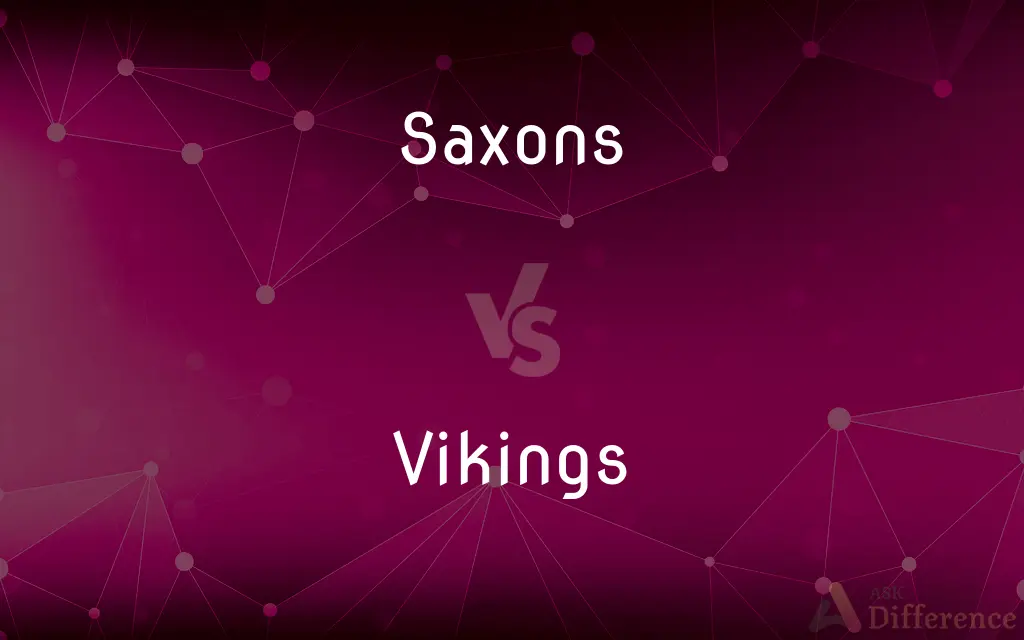Saxons vs. Vikings — What's the Difference?
Edited by Tayyaba Rehman — By Fiza Rafique — Updated on October 13, 2023
Saxons were Germanic tribes that settled in England. Vikings were Norse seafarers known for raids and exploration. Both played key roles in early medieval European history but hailed from different regions.

Difference Between Saxons and Vikings
Table of Contents
ADVERTISEMENT
Key Differences
The Saxons were a group of Germanic tribes that originated from what is now Northern Germany. These tribes began their migration to Britain during the late Roman period, eventually establishing several kingdoms in what is now England. The Vikings, on the other hand, were seafaring Norse people from the late eighth to the early 11th century, originating from what are now Denmark, Norway, and Sweden.
While the Saxons had a more settled agricultural society in England, the Vikings were known for their prowess at sea. Their iconic longships allowed them to navigate both open seas and shallow rivers, facilitating raids, trading, and exploration. Both groups, however, were skilled warriors and had their own distinct weaponry and combat techniques.
Religion also marked a difference between the two. Initially, the Saxons practiced a polytheistic religion, worshiping Germanic deities. They later converted to Christianity, especially after the Roman mission led by Augustine in 597 AD. The Vikings, meanwhile, believed in Norse gods like Thor, Odin, and Freyja until they too started converting to Christianity around the 10th century.
In terms of language, the Saxons spoke Old English, a Germanic language that laid the foundation for modern English. The Vikings spoke Old Norse, which gave rise to the Scandinavian languages of today. Both Old English and Old Norse have left significant marks on the English language, contributing many words and names.
Culturally, both the Saxons and Vikings had rich oral traditions, with sagas, legends, and poetry detailing their history, beliefs, and values. The Vikings, with their runestones and sagas, and the Saxons, with texts like the "Anglo-Saxon Chronicle," left behind significant historical records that provide insights into their respective societies.
ADVERTISEMENT
Comparison Chart
Origin
Germanic tribes from Northern Germany.
Norse people from Denmark, Norway, and Sweden.
Lifestyle
Settled agricultural society in England.
Seafaring, known for raids, trading, and exploration.
Religion
Initially polytheistic, later converted to Christianity.
Norse polytheism, later shifted to Christianity.
Language
Spoke Old English.
Spoke Old Norse.
Cultural Records
Notable for the "Anglo-Saxon Chronicle."
Known for sagas and runestones.
Compare with Definitions
Saxons
Germanic tribes that migrated to and settled in England.
The Saxons established several kingdoms in England after the Romans left.
Vikings
Norse seafarers known for their exploration and raids.
The Vikings traveled as far as North America, long before Columbus.
Saxons
A people who converted to Christianity in the early medieval period.
The conversion of the Saxons to Christianity marked a pivotal moment in their history.
Vikings
Warriors with a strong oral tradition, including sagas.
Viking sagas tell tales of heroism, exploration, and gods.
Saxons
Early inhabitants of England who spoke Old English.
The literature of the Saxons provides insights into their daily lives.
Vikings
Inhabitants of Scandinavia during the Viking Age (8th to 11th century).
The Vikings had a rich pantheon of gods, including Thor and Odin.
Saxons
Warriors and settlers who had frequent interactions with neighboring tribes and groups.
The Saxons had both conflicts and alliances with other groups like the Vikings.
Vikings
A people who gradually converted to Christianity during the late Viking Age.
Over time, many Vikings adopted Christianity, influencing their art and culture.
Saxons
A group that, along with Angles and Jutes, played a foundational role in English history.
The Saxons' influence on England can still be seen in place names and language.
Vikings
Expert shipbuilders who designed the iconic Viking longship.
The Vikings' longships allowed them to raid and trade across vast distances.
Saxons
The Saxons (Latin: Saxones, German: Sachsen, Old English: Seaxan, Old Saxon: Sahson, Low German: Sassen, Dutch: Saksen) were a group of early Germanic peoples whose name was given in the early Middle Ages to a large country (Old Saxony, Latin: Saxonia) near the North Sea coast of northern Germania, what is now Germany. In the late Roman Empire, the name was used to refer to Germanic coastal raiders, and also as a word something like the later "Viking".
Vikings
Vikings is the modern name given to seafaring Norse pirates from southern Scandinavia (present-day Denmark, Norway and Sweden) who from the late 8th to the late 11th centuries raided, pirated, traded and settled throughout parts of Europe. They also voyaged as far as the Mediterranean, North Africa, the Middle East, and North America.
Saxons
A member of a West Germanic tribal group that inhabited northern Germany and invaded Britain in the fifth and sixth centuries AD with the Angles and Jutes.
Vikings
One of a seafaring Scandinavian people who raided the coasts of northern and western Europe from the eighth through the tenth century.
Saxons
A person of English or Lowland Scots birth or ancestry as distinguished from one of Irish, Welsh, or Highland Scots birth or ancestry.
Vikings
A Scandinavian.
Saxons
A native or inhabitant of Saxony.
Vikings
Plural of viking
Saxons
The West Germanic language of any of the ancient Saxon peoples.
Saxons
The Germanic element of English as distinguished from the French and Latin elements.
Common Curiosities
Where did the Saxons originate?
The Saxons originated from what is now Northern Germany.
Were Vikings just raiders?
While Vikings are often associated with raids, they were also explorers, traders, and settlers.
Were the Saxons pagans?
Initially, the Saxons practiced a polytheistic religion but later converted to Christianity.
How did the Saxons impact England?
The Saxons established kingdoms, introduced Old English, and played a foundational role in England's history.
Did the Vikings have a written language?
Yes, the Vikings used runes, an alphabetic script, for writing.
Were all Vikings warriors?
While many Vikings were warriors, others were traders, craftsmen, and farmers.
What is the Viking Age?
The Viking Age refers to the period from the late 8th to the early 11th century when Vikings were most active.
What language did the Saxons speak?
The Saxons spoke Old English.
What were Viking longships?
Viking longships were versatile boats designed for both deep-sea travel and river navigation.
What regions did the Vikings explore?
Vikings explored regions including Europe, Asia, and North America.
Did the Saxons and Vikings ever interact?
Yes, the Vikings invaded and settled in areas of Saxon-controlled England, leading to conflicts and cultural exchanges.
What religion did the Saxons follow before Christianity?
The Saxons initially followed a polytheistic Germanic religion.
Who were the Anglo-Saxons?
The Anglo-Saxons were a blend of tribes, including the Saxons, Angles, and Jutes, who settled in England.
Were the Saxons and Vikings similar in any way?
Both had warrior cultures, rich oral traditions, and over time, both groups transitioned to Christianity.
Did Vikings have a code of honor?
Yes, the Vikings had a strong sense of honor, detailed in sagas and their oral tradition.
Share Your Discovery

Previous Comparison
Cyberpunk vs. Steampunk
Next Comparison
Kinematics vs. DynamicsAuthor Spotlight
Written by
Fiza RafiqueFiza Rafique is a skilled content writer at AskDifference.com, where she meticulously refines and enhances written pieces. Drawing from her vast editorial expertise, Fiza ensures clarity, accuracy, and precision in every article. Passionate about language, she continually seeks to elevate the quality of content for readers worldwide.
Edited by
Tayyaba RehmanTayyaba Rehman is a distinguished writer, currently serving as a primary contributor to askdifference.com. As a researcher in semantics and etymology, Tayyaba's passion for the complexity of languages and their distinctions has found a perfect home on the platform. Tayyaba delves into the intricacies of language, distinguishing between commonly confused words and phrases, thereby providing clarity for readers worldwide.














































